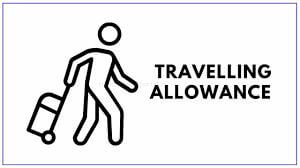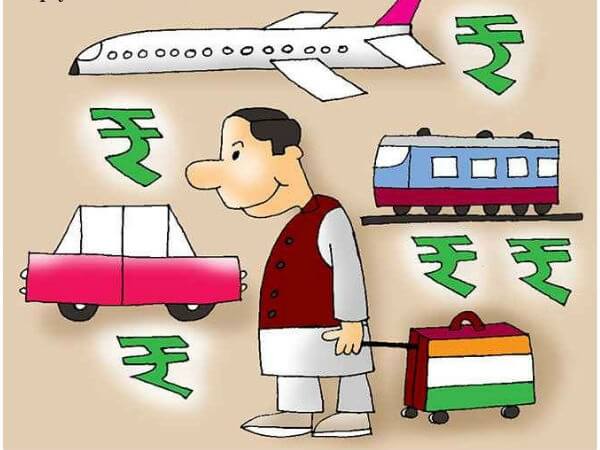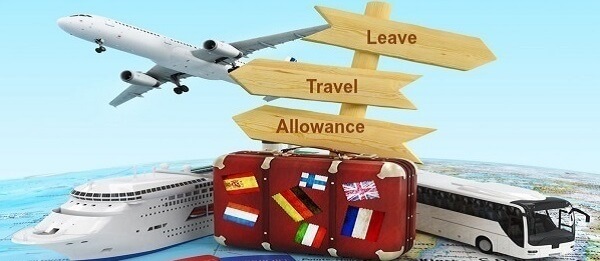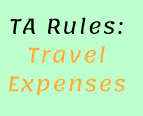What is the full form of TATA: Travelling AllowanceTravelling Allowance: What it is and How it WorksTA stands for Travelling allowance. It is also known as travel reimbursement, is a type of financial compensation provided by an employer to an employee for expenses incurred during business travel. These expenses can include transportation costs (airfare, train tickets, taxi fares, etc.), accommodation costs (hotel bills, meals, etc.), and other miscellaneous expenses (such as baggage fees, visas, and travel insurance). In general, travel allowances are granted to employees who are required to travel as part of their job responsibilities. This can include sales representatives, field engineers, company executives, and employees who need to travel to attend business meetings, conferences, and training sessions or work remotely. 
The purpose of a travel allowance is to cover the expenses associated with business travel so that employees do not have to bear the cost themselves. This can be particularly important for employees who are required to travel frequently, as it can help alleviate the financial burden associated with travel. The travel allowances an employee is eligible for will vary depending on several factors, including the nature of the business travel, the employee's job role, and the company's travel policy. Some companies provide a fixed travel allowance for each trip, while others may offer a per diem rate based on the estimated costs for each day of travel. Employees need to be aware of their company's travel policy, as this will provide information about the types of expenses that are eligible for reimbursement and the maximum amount that can be claimed. Some companies may also have specific rules around the types of expenses that are eligible for reimbursements, such as restrictions on the cost of meals or the type of hotel that can be used. Requisites to Claim Travel AllowanceTo claim a travel allowance, employees typically need to provide proof of the expenses incurred during their business travel. This can include receipts for transportation, accommodation, and other expenses. In some cases, employees may also need to provide a written report outlining the purpose of the trip and the expenses incurred. Another crucial criterion is to be eligible for reimbursement. Employees must keep thorough records of all their travel expenses, including invoices and receipts. Additionally, workers must ensure that the invoices and receipts are legible, comprehensive, and appropriately reflect the costs incurred. Employees must keep accurate records of their expenses, as they must provide these to claim their travel allowance. Employees should also ensure they are aware of any deadlines for submitting claims and any requirements for the format of the claims. The first condition for receiving a travel reimbursement is that the trip must be necessary for professional reasons. This means a travel allowance cannot be used to pay for personal travel, such as a weekend getaway or family vacation. Employers should be permitted to insist that employees show proof of the trip's business-related character. 
Most businesses cap the amount that can be reimbursed for travel expenditures. This cap is typically determined by the price of a certain travel class, like economy class or daily cap. Employees should become familiar with the company's travel allowance policy and adhere to it while incurring charges. Here are the following requisites: Pre-Approval Before incurring travel expenses, employees, in some circumstances, may need to obtain pre-approval from their employer. This can entail giving a rough idea of the anticipated costs and a thorough trip plan. This makes it easier to check that the costs are appropriate and adhere to the budget that the employer has agreed to. Reimbursement Schedule Depending on the company's policy, travel expenses may be reimbursed at different times. While other businesses may refund costs as they are incurred, some may do so only after the trip has concluded. To ensure the company's reimbursement schedule policy is clear to employees, employees should be aware of their company's reimbursement schedule policy. Transport Method The travel allowance may be affected by the mode of transport used for the journey. For instance, some employers may only cover the expense of travel in economy class, while others may permit travel in business class. Employees should consult their company to find the proper means of transportation for their journey. Travel Insurance Employers occasionally include travel insurance in employee travel expenses. This insurance may cover an accident, illness, or another travel-related emergency. Employees should become familiar with the travel insurance coverage offered by their employer and be aware of the limitations. Tax Ramifications Employees should be aware of travel expenses tax ramifications since they are taxable in most jurisdictions. Suppose they are incurred while away from home on a business trip. Some employees may be entitled to claim a tax deduction for specific travel costs, such as accommodation and meals. Employees should speak with a tax expert to fully comprehend the tax ramifications of their trip reimbursements. Firm Policy Each company has its policies regarding travel reimbursements. Thus, employees need to be aware of these. This can include details about the trip's objectives, the maximum financial reimbursement allowed when it will be made up, the means of transportation, and any potential tax repercussions. BenefitsOne of the key benefits of a travel allowance is that it can help to reduce the financial burden of business travel. Another benefit of a travel allowance is that it can help to ensure that employees can attend important business meetings and events, even if they are located in remote locations. This can be particularly important for sales representatives and field engineers, who may need to travel to attend customer meetings or perform work remotely. In addition to the financial benefits, travel allowances can foster employee fairness and equality. By providing financial support for business travel, employers can help ensure that all employees can participate in important business activities, regardless of their financial situation. 
A travel allowance is an important benefit that can support employees who are required to travel as part of their job responsibilities. Covering the expenses associated with business travel can reduce the financial burden of travel and ensure that employees can attend important business events, regardless of their location. It is important for employees to be aware of their company's travel policy and to keep accurate records of their expenses to ensure that they can tax the implications of travel allowances. Overall, travel allowances can be a beneficial perk for staff members, helping to foster professional and personal development by covering travel costs related to work. Employees can make the most of this perk and guarantee that their travels are fruitful and effective by adhering to the fundamental guidelines and regulations and being educated about their employer's policy. Effects of Travel Allowances on Employers and EmployeesOne of the important things to consider when receiving a travel allowance is the tax implications. In most countries, travel allowances are considered taxable income and, therefore, subject to income tax. This means that employees must declare their travel allowances on their tax return and pay tax on the amount received. Employees may receive travel allowances from their employers as a payment to help defray the cost of business travel. These payments can be a fixed sum of money or reimbursement for travel, housing, and food. Employees can benefit the most from this perk and steer clear of any misunderstandings or errors by learning the fundamental guidelines for travel allowances. In conclusion, travel reimbursements can significantly benefit staff members, but it's crucial to comprehend the fundamental guidelines. Employees should make an effort to learn about their company's travel allowance policy, keep thorough records of their spending, and understand how these allowances may affect their taxes. Employees can make the most of this perk and avoid misunderstandings or mistakes by handling travel allowances properly. Additionally, it's crucial to remember that some nations have special rules and laws governing travel reimbursements. For instance, some nations may have limitations on the amount that can be reimbursed for transportation, others may have regulations governing the amount of per diem used for meals. Employees should be aware of these rules and laws to ensure they follow them. Employers should have simple and clear procedures for travel reimbursements and promptly and effectively convey these policies to staff members. This helps avoid misunderstandings or disagreements by ensuring employees know their rights and obligations regarding travel reimbursements. What is the Rate of TA?The amount of travel reimbursement differs according to a number of variables, including the itinerary, the employer's policy, and the destination. Generally speaking, travel costs like lodging, meals, and transportation are covered by the travel allowance. The amount of the travel allowance may be set at a certain rate per day, mile, or based on the real costs incurred. For domestic travel, some businesses might charge a flat fee of $50 per day for meals and incidentals, while others might charge a per diem rate that changes depending on the destination. Some employers will pay employees real airfare or rental car costs for transportation expenditures, while others may use a mileage reimbursement system. Who is Not Eligible for Transport Allowance?The requirements for receiving a transport allowance (TA) can differ based on the organisation or nation, but the following are some instances of people who might not be eligible: Those workers who do not commute: Employees who work from home or live on the premises (such as live-in carers) might need to be qualified for TA. Employees with access to a business vehicle include: An employee might not be qualified for TA if provided with a corporate vehicle or another mode of transportation. Those who hold part-time jobs: In some companies, part-time workers might not be entitled to the same benefits, such as TA, as full-time workers. Employees that reside around their place of employment. Employees who reside close to their place of employment may not qualify for TA benefits because some organisations may have a minimum distance limit. 
Self-employed people or independent contractors: Someone would not be qualified for TA from a certain organisation if they are not employees. TA (Transport Allowance) is calculated differently depending on the organisation or nation, although it frequently takes the employee's level or position within the company into consideration. How TA is CalculatedHere are a few instances of how TA may be determined: Fixed amount: Regardless of rank or pay, some companies provide a set amount of TA to all employees. For instance, a company might provide each employee with $100 monthly for travel expenses. Depending on pay: The quantity of TA a worker, receives occasionally is determined by their salary. As an illustration, a company might offer TA for 5% of an employee's pay. Therefore, a worker making $50,000 a year would get $2,500 in TA per year. Several organisations offer various TA levels depending on the employee's position or employment level. Managers might receive $200 per month in TA, while entry-level employees only receive $50. Distance-based calculation: The employee's travel time to work may be considered for determining TA in particular circumstances. For instance, a company might pay employees $1 for every mile they travel above 10 miles to get to work. Remember that there might be a large variation based on the business or country. These are just a few examples of how TA might be computed. What is the Time Limit for Submission of the TA Claim?The deadline for submitting a TA (Transport Allowance) claim may be outlined in the company's policy or collective bargaining agreement, depending on the organisation or country. However, employees are typically obliged to submit their TA claims within a specific time following the incurrence of expenses. For instance, some companies can mandate that workers submit their TA claims by 30 days following the end of the month in which the costs were incurred. The deadline for submitting TA claims may be shorter or longer for other organisations. Employees must be informed of the precise deadline for submitting their TA claims and do so on time. Otherwise, they risk having their reimbursement requests denied. Is Transport Allowance Fully Taxable?Transport Allowance (TA) is partially taxable in many nations, including India. Taxes are payable on any TA that exceeds Rs. 1,600 per month since it qualifies as taxable income. Tax-free income in India is limited to a maximum of Rs. 1,600 per month (as of the anticipated cut-off date of September 2021). To ascertain the tax ramifications of getting a TA, you must verify with the tax authority or a licenced tax professional in your area. This is because the tax treatment of TA can differ depending on the nation or jurisdiction. Is TA Exempted from Income Tax?Transport allowance (TA) is frequently partially excluded from income tax, though the tax treatment of TA might vary by country or jurisdiction. Other nations, including the United States, do not specifically exempt TA from paying taxes. However, if certain conditions are met, such as if their employer does not pay them for such costs, employees may be allowed to deduct their transportation costs from their taxable income. To find out the tax repercussions of obtaining a TA, it's crucial to consult your local tax authorities or a knowledgeable tax practitioner.
Next TopicFull Forms List
|
 For Videos Join Our Youtube Channel: Join Now
For Videos Join Our Youtube Channel: Join Now
Feedback
- Send your Feedback to [email protected]
Help Others, Please Share










